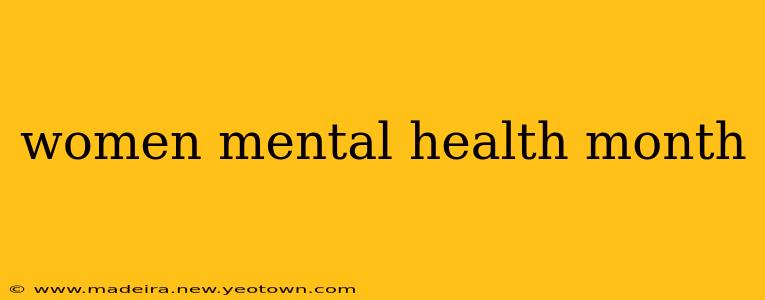October is Women's Mental Health Month, a time dedicated to raising awareness about the unique mental health challenges women face and promoting access to vital resources and support. It's more than just a month; it's a movement, a call to action, and a chance for us to collectively champion better mental wellbeing for women everywhere. This journey begins with understanding the complexities of women's mental health.
What are the unique mental health challenges faced by women?
Women experience a unique constellation of stressors and mental health conditions that often differ from those experienced by men. Societal pressures, hormonal fluctuations, and ingrained gender roles contribute significantly to these disparities. Consider the weight of societal expectations surrounding motherhood, career success, and maintaining a perfect home life – a burden many women silently carry. Add to this the higher rates of experiencing domestic violence, sexual assault, and harassment, and you begin to understand the depth of the challenges. We'll delve deeper into these specific issues shortly.
What are the most common mental health conditions affecting women?
While any mental health condition can affect anyone regardless of gender, some conditions appear more prevalent in women. Anxiety disorders, such as generalized anxiety disorder (GAD) and panic disorder, are commonly reported. Depression, often manifesting differently in women than in men, is another significant concern. Postpartum depression (PPD), impacting mothers after childbirth, is a crucial area demanding increased attention and support. Eating disorders, such as anorexia nervosa and bulimia nervosa, also disproportionately affect women. The complex interplay between biological, psychological, and social factors contributes to these higher rates.
How do hormonal changes affect women's mental health?
Hormonal fluctuations throughout a woman's life—puberty, menstruation, pregnancy, postpartum, and menopause—can significantly influence mental wellbeing. These shifts can trigger or exacerbate existing mental health conditions. For example, the dramatic hormonal changes during pregnancy and postpartum can lead to mood swings, anxiety, and even psychosis in some cases. Similarly, the hormonal shifts of perimenopause and menopause can impact mood, sleep, and cognitive function. Understanding these hormonal connections is critical in diagnosing and treating mental health issues in women.
What are the resources available for women struggling with their mental health?
Accessing support is paramount. A range of resources exists to assist women navigating mental health challenges. Therapists specializing in women's mental health provide a safe and confidential space to explore issues and develop coping mechanisms. Support groups offer peer-to-peer connection and shared experiences, fostering a sense of community and understanding. Online platforms and helplines provide immediate access to information and crisis support. Remember, seeking professional help is a sign of strength, not weakness.
What are the signs and symptoms of mental health conditions in women?
Recognizing the signs of mental health struggles is crucial for early intervention. Symptoms can vary greatly depending on the individual and the specific condition. However, common signs include persistent sadness, loss of interest in activities, changes in sleep patterns, irritability, difficulty concentrating, feelings of hopelessness, and changes in appetite or weight. It's crucial to remember that these symptoms can manifest subtly and may be easily overlooked. If you suspect someone is struggling, reach out and offer your support.
How can I support a woman struggling with her mental health?
Supporting a woman facing mental health challenges involves empathy, patience, and understanding. Listen without judgment, offer practical help when possible (e.g., assisting with childcare or errands), and encourage her to seek professional help. Validate her feelings and experiences, remind her that she's not alone, and gently encourage self-care practices. Your support can make a world of difference.
This Women's Mental Health Month, let's commit to fostering a culture of understanding, empathy, and support for women's mental wellbeing. By raising awareness, breaking down stigmas, and promoting access to resources, we can collectively contribute to a healthier and more supportive world for women everywhere. Remember, you are not alone. Help is available.

